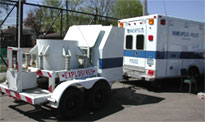
Typically, injured employees who sustain injuries in the course and scope of their employment are unable to bring civil claims for damages they sustained. In certain circumstances when the injured worker can demonstrate that a third-party, meaning someone other than his or her employer or an agent of his or her employer, caused the injury, then he or she can bring a workers’ compensation claim and a civil claim.
In Minnesota workers’ compensation claims, it does not matter to the judge if it was the employer or the employee’s fault that he or she sustained an injury. All that matters, is that an injury occurred and the nature and extent of that injury. Typically, attorneys do not need photographic evidence of the incident. However, in civil cases, it matters which party caused the accident.
Frequently insurance companies try to deny the seriousness of the injury or that an injury occurred. Photographs of the damage to the vehicle or photographs of the machine that caused the injury in this type of claim are helpful. For example, when a jury can see the extent of the damage to the vehicle, it becomes hard to deny that a person sustained a head injury. Video in addition to photographs also may help. Dashboard cameras in squad cars are very helpful to show the impact inside the vehicle, if the person is a police officer who was struck.
Sometimes defendants in civil actions, the responsible party at-fault for the injury, may try to “exclude” evidence. They may argue that the evidence may not be relevant or admissible under the Minnesota Rules of Evidence to prove that they were at fault, that an injury happened, or the nature and extent of the injury. However, photographs of the damage to the vehicle and squad car video is relevant and admissible in civil claims. Photographs of your own injuries right after the collision are also helpful. They help to demonstrate that you did sustain damages. Sometimes doctors in the emergency room do not document all your visible injuries.
In order to pass the court’s test for admissibility, the plaintiff or the injured party must show that the evidence is relevant under Rule 402 of the Minnesota Rules of Evidence. Relevant evidence is defined as “evidence having any tendency to make the existence of any fact that is of consequence to the determination of the action more probable or less probable that it would be without the evidence.” See State v. Quick, 659 N.W.2d 701, 713 (Minn. 2003). See also Hagel v. Schoenbauer. 532 N.W. 2d 255, 258 (Minn. Ct. App. 1995).
Even in personal injury cases, wherein liability has been admitted by the defendant and the only issue for the jury is the amount of the damages, the photographs and video are relevant because they demonstrate the force of the impact. The impact between the vehicles helps to establish the extent of the plaintiff’s injury.Baltus v. von der Lippe, 293 Minn. 99, 100-101, 196 N.W.2d 922, 923 (1972).
Furthermore, parties must demonstrate that the photographs and video are not unduly prejudicial, meaning that the purpose of the evidence is not to make the jury very angry at the defendant. However, photographs and video can’t be excluded just because they are damaging to the defendant’s case. Graphic photographs from criminal cases are typically not excluded.
It’s important that if you, your partner, or someone in your family sustains an injury in a motor vehicle collision that you make sure the squad video, or body camera footage is preserved and that you take pictures of the damage to the vehicles as well as any physical injuries of yourself for use in litigation.
If you or someone you love has sustained a career-ending injury in the line of duty as a police officer, firefighter, or first responder contact the attorneys at Meuser Law Office, P.A. for a free, no-obligation consultation. In order to maximize all possible sources of recovery, you need attorneys who practice in PERA and MSRS disability, workers’ compensation, and personal injury and who are well versed in the intricacies of the law where these three areas meet. Call us today at 1-877-746-5680.

